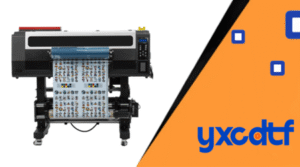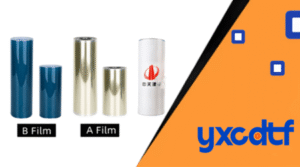UV DTF (Ultraviolet Direct to Film) printing has emerged as a game-changing technology for printing on hard, smooth, and non-porous surfaces. In 2025, it continues to evolve with new formats like Foil UV DTF and 3D UV DTF for textiles, unlocking exciting possibilities for promotional product manufacturers, packaging specialists, and custom merch businesses. This article is a complete guide to UV DTF: how it works, what it prints on, how it compares to traditional methods, and why it’s the future of hard-surface printing.
1. What Is UV DTF Printing?
UV DTF (Ultraviolet Direct to Film) printing is a cutting-edge digital printing technology that allows full-color, high-resolution designs to be transferred onto rigid, non-porous surfaces like glass, acrylic, plastic, metal, and coated wood—without heat or water.
📌 Definition:
UV DTF uses a UV-curable ink system printed on a transparent film (A Film), laminated with an adhesive film (B Film), then peeled and pressed onto the surface of an object. The ink is instantly cured using UV light, resulting in vibrant, waterproof, and scratch-resistant designs.
Unlike textile DTF, UV DTF cannot be used on fabrics, as UV inks lack the elasticity required for washable, flexible surfaces.
2. How Does UV DTF Work?
The UV DTF workflow is efficient and relatively simple for production lines:
| Step | Description | Equipment |
|---|---|---|
| 1 | Design your image (300 DPI recommended) | Photoshop, CorelDRAW |
| 2 | Print color layers (CMYK + White + Gloss Varnish) on A Film | UV DTF Printer |
| 3 | Laminate B Film onto A Film | Cold Laminator |
| 4 | Peel off backing | Manual |
| 5 | Apply to surface with pressure | Hand or roller |
✅ Pro Tip: A single application can be completed in less than 90 seconds, making it highly efficient for short-run production.And in the market, you can use the uv dtf all-in-one printer when finish print the A film then can laminate b film in time. You no need to buy laminator again. But this demands on your demands, if you want the small uv printer without laminated function,there have to buy laminator together.
3. Materials and Equipment Required
To start UV DTF printing, you’ll need:
| Component | Purpose |
|---|---|
| UV DTF Printer | Dual-head printer with UV LED curing |
| UV Ink | CMYK + White + Varnish (gloss layer) |
| Film A | Coated PET film for ink printing |
| Film B | Pressure-sensitive adhesive film |
| Cold Laminator | Binds A and B films |
| Application tools | Peeling tool, roller, gloves |
🔗 Related Link: Explore YXCHTV’s UV DTF Printers and Consumables
🎯 4. Compatible Surfaces: Where UV DTF Excels
UV DTF shines on non-porous, hard, and smooth surfaces that traditionally required screen printing, stickers, or pad printing.
| Surface Type | Examples |
|---|---|
| Glass | Bottles, jars, panels |
| Acrylic | Signs, keychains, badges |
| Metal | Flasks, aluminum plates |
| Ceramic | Mugs, tiles, giftware |
| Plastic (ABS, PVC) | Phone cases, boxes |
| Coated Wood | Gift boxes, boards |
✅ Fact Check: UV DTF cannot adhere to untreated fabrics, rubber, or leather.
5. UV DTF vs Traditional UV Printing
| Feature | UV DTF | Traditional UV Flatbed |
|---|---|---|
| Surface compatibility | Curved & flat surfaces | Flat surfaces only |
| Production flexibility | Highly scalable, low MOQ | Higher setup threshold |
| Pre-print transfer | Yes (can ship as sticker) | No (prints directly) |
| Heat usage | None | None |
| Image durability | High | High |
🧠 Expert Insight: UV DTF gives smaller businesses access to the benefits of UV printing without investing in expensive flatbed systems.
6. Benefits of UV DTF Printing for B2B Businesses
✅ Key Advantages:
-
No heat or water required
-
Quick turnaround time (under 2 minutes per item)
-
High-resolution print quality
-
Perfect for odd shapes and curved surfaces
-
Scalable for short or large runs
-
Waterproof, fade-resistant, and scratch-proof
📊 Case Study:
A promotional gift supplier in Canada reduced their production costs by 35% and increased average item value by 50% by switching to UV DTF for branding metal drinkware and packaging inserts.
7. Cost Breakdown and ROI
| Item | Estimated Cost (USD) |
|---|---|
| UV DTF Printer | $4,000 – $8,000 |
| A/B Film (per sqm) | $1.00 – $1.50 |
| UV Ink (per liter) | $70 – $90 |
| Laminator | $300 – $500 |
| Avg. Cost Per Product | $0.10 – $0.40 |
| Suggested Resale Price | $2.00 – $6.00 |
✅ Fact Check: Break-even can often be achieved within 3–6 months depending on product volume and pricing strategy.
8. 2025 Emerging Trends in UV DTF Printing <
🥇 8.1 Foil UV DTF Printing
Foil UV DTF adds gold, silver, holographic, or metallic textures to the transfer. It uses an additional foil film layer during the curing stage.
Features:
-
Premium metallic finish
-
Compatible with existing UV DTF printers (minor tweaks)
-
Ideal for cosmetics, wine, gift boxes
💬 Use Case: A candle manufacturer used Foil UV DTF to create premium jar branding, increasing customer retention and retail price.
👕 8.2 Textile UV DTF (3D UV DTF HTV)
Although UV DTF is not designed for fabrics, Textile UV DTF or 3D UV DTF HTV uses a flexible heat transfer base to simulate the glossy UV effect on garments.
Features:
-
Glossy, embossed vinyl-like finish
-
Limited stretch and wash durability
-
Applied using heat press (130–150°C)
-
Ideal for fashion accents or small patches
⚠️ Warning: Not suitable for high-flex or washable clothing. Best used for chest logos or decorative labels.
| Feature | Textile UV DTF |
|---|---|
| Flexibility | Low–Medium |
| Washability | Limited |
| Use Case | Fashion, logo accents |
| Application Temp | 130–150°C |
9. Top Use Cases and Industries
| Industry | Application |
|---|---|
| Drinkware OEMs | Logo printing on tumblers, flasks |
| Promotional Gift Factories | Full-color branding on merchandise |
| Signage & Acrylic Crafts | Personalized signs and tags |
| Packaging & Labeling | Premium foil or color labels |
| Souvenir & Tourism Retailers | Keychains, badges, ornaments |
| Fashion / Streetwear Brands | 3D gloss logo patches (HTV) |
🔗 Internal Link Suggestion: Explore UV DTF solutions at YXCHTV
10. Common Misconceptions and FAQs
1. Can UV DTF be used on fabric?
No. UV inks are rigid and will crack on soft materials.
2.What’s the shelf life of unused UV DTF transfers?
Typically 6–12 months, if stored in cool, dry conditions.
3.Is special training required?
Basic training is needed for setup and color profiling, but it’s beginner-friendly for most print operators.
4. What is the difference between UV DTF and Foil UV DTF?
✅ Standard UV DTF uses UV-curable CMYK + white + varnish inks to create high-resolution, glossy prints with full-color visuals. It’s ideal for vibrant designs and branding on hard, non-porous surfaces like acrylic, glass, and plastic.
✨ Foil UV DTF, on the other hand, integrates metallic foil films into the transfer process. The foil is selectively applied over UV-curable adhesive ink, allowing you to achieve metallic effects (e.g., gold, silver, holographic). It’s particularly useful for premium packaging, candles, wine bottles, and cosmetics branding.
| Feature | Standard UV DTF | Foil UV DTF |
|---|---|---|
| Finish | Glossy, full-color | Metallic, reflective |
| Materials Used | UV Ink, A/B Film | UV Ink + Foil Film + A/B Film |
| Use Case | General branding | Luxury/premium products |
5. What is the difference between DTF transfer and Textile UV DTF?
DTF transfer (textile DTF) is designed specifically for fabric printing, using pigment inks, hot melt powder, and a heat press to transfer full-color designs onto cotton, polyester, and blends.
Textile UV DTF (or 3D UV DTF HTV) is not traditional DTF. Instead, it involves printing UV ink onto a flexible HTV (Heat Transfer Vinyl) base. It is then transferred with heat onto textiles. However, it is not stretchable or washable long-term like DTF, and is mainly used for embossed logo patches or fashion accents.
| Feature | DTF Transfer (Textile) | 3D UV DTF HTV |
|---|---|---|
| Ink Type | Pigment Ink | UV Ink |
| Durability | High (washable, flexible) | Low (decorative only) |
| Flexibility | Excellent | Limited |
| Application | Entire fabric surfaces | Spot logos/labels |
6. What materials are used in Textile UV DTF printing?
Textile UV DTF (3D UV DTF HTV) typically uses the following materials:
-
✅ Heat Transfer Vinyl (HTV) Film – Specially coated to accept UV ink while remaining flexible enough for heat press
-
✅ UV-curable Inks – CMYK + white + varnish
-
✅ Protective film backing – To support peeling and transfer
-
✅ Heat press machine – Typically 130–150°C for 15–20 seconds
⚠️ Washability is limited. Not suitable for garments that require daily washing or stretching.
7. What material kits are required for 3D Textile UV DTF printing?
To execute 3D UV DTF HTV printing successfully, you need the following kit:
| Material/Equipment | Purpose |
|---|---|
| UV Ink Set (CMYK+W+V) | For color printing and gloss texture |
| Flexible HTV Film | Acts as transfer base for textiles |
| UV DTF Printer (adjustable height) | For printing on flexible film |
| Heat Press Machine | Required for final transfer to fabric |
| Cutting Plotter (optional) | For contouring logos or patches |
✅ These kits are available from vendors like YXCHTV, tailored to fashion and garment decoration applications.
8. What material kits are required for Foil UV DTF printing?
Foil UV DTF requires a few additional consumables compared to standard UV DTF:
| Material | Description |
|---|---|
| UV Inks (CMYK+White) | Base color layers |
| UV Adhesive Layer | Applied to target areas where foil is needed |
| Metallic Foil Film | Gold, silver, holographic, etc. |
| A Film (Printing Film) | PET-coated film for ink |
| B Film (Laminating Film) | Cold-pressed adhesive for final transfer |
| UV DTF Printer | Supports layered printing and foil integration |
| Cold Laminator | Applies adhesive film to foil print |
📌 Tip: Foil DTF doesn’t require a heat press. All curing is done via UV light.
Conclusion: Is UV DTF Right for Your Business?
UV DTF printing is not just a passing trend — it is a high-impact, scalable, and profitable printing method ideal for businesses that focus on:
-
Rigid product customization
-
Promotional branding
-
Giftware manufacturing
-
High-margin personalized products
With the 2025 innovations in foil effects and textile HTV, UV DTF is becoming more versatile than ever.
🛍️ Partner with YXCHTV — Your UV DTF Solution Provider
At YXCDTF, we offer:
-
✅ Complete UV DTF printing systems
-
✅ Premium A/B films and UV inks
-
✅ Foil UV DTF solutions
-
✅ Expert training & tech support
-
✅ Global shipping & OEM customization
📦 Explore Products: https://www.yxchtv.com/product-category/uv-dtf
📨 Contact Us: https://www.yxcdtf.com/contact-us
💬 Let’s help you reduce cost, increase output, and scale your business with UV DTF in 2025.


